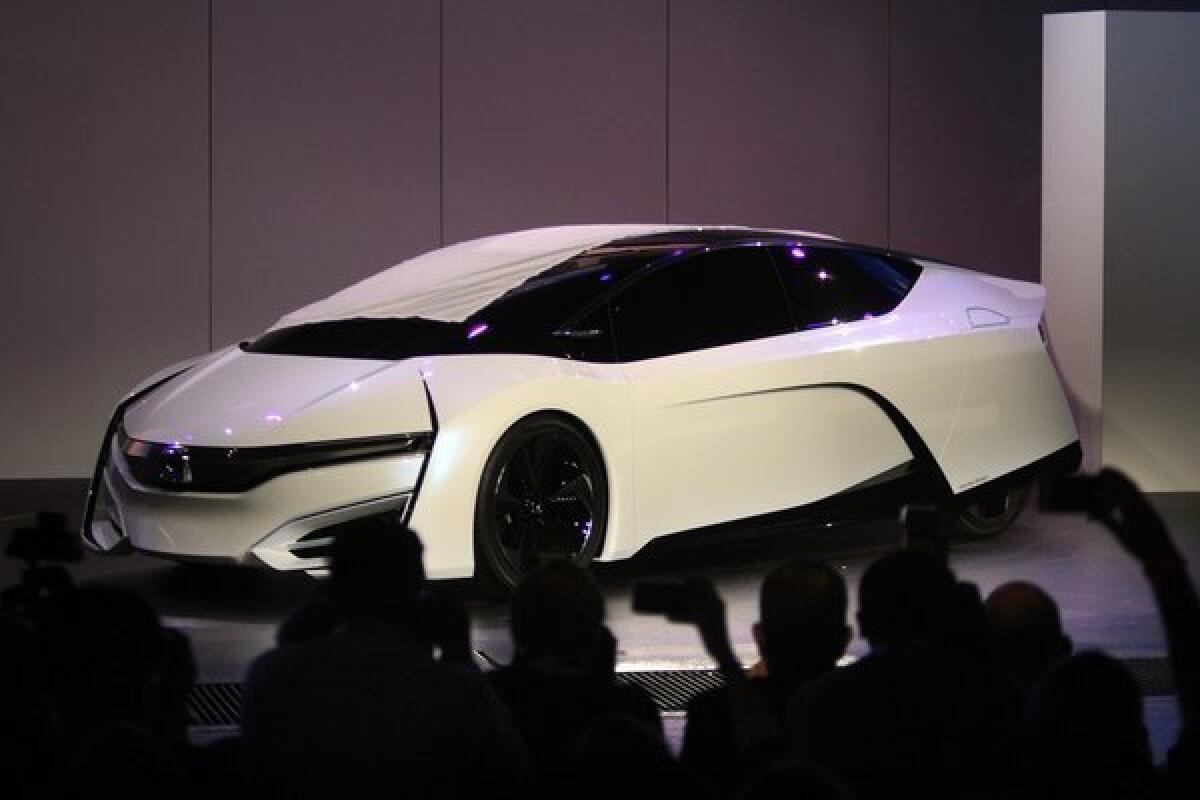L.A. Auto Show: Hydrogen vs. electric -- which is superior?

- Share via
Hydrogen fuel cell cars were the big talk of the L.A. Auto Show this week -- but will they catch on?
That’s the question we put to some of the top auto industry executives in the United States. We were looking for insight into what will be the dominant zero emission car technology 20 years from now, cars powered by hydrogen or electric vehicles with rechargeable batteries?
Opinion was divided.
PHOTOS: L.A. Auto Show model debuts
The North American CEOs from Honda, Toyota and Hyundai -- all companies that said during the show that they plan to bring hydrogen cars to market within two years -- voted for hydrogen.
Honda believes that fuel cells will be “the ultimate technology for the future,” said Tetsuo Iwamura, president and chief executive of the Americas, Honda Motor Co.
They have the driving distance and refueling time that consumers want, but he conceded that they will be held back in the near term because “the technology is expensive and we don’t have a refueling infrastructure.”
Toyota’s North American Chief Executive Jim Lentz said he believes that hydrogen will “win” eventually but that the Japanese automaker believes that there will be a long time in which automakers rely on hybrid technology to increase efficiency and reduce emissions.
“The superior range and fast-fill refueling speed of our Tucson fuel-cell vehicle contrast with the lower-range and slow-charge characteristics of competing battery electric vehicles,” said John Krafcik, chief executive of Hyundai Motor America. “We think fuel-cell technology will increase the adoption rate of zero-emission vehicles, and we’ll all share the environmental benefits.”
Others disagree.
Volkswagen of America Chief Executive Jonathon Browning said the company chose to produce a battery-powered Golf hatchback that it displayed at the show rather than a fuel-cell car for one simple reason: “Most people know where to find a socket,” he said. “Not too many people know where to find a hydrogen fueling station.”
“Hydrogen is still a long way off from mainstream commercial vehicles,” Browning said.
General Motors has spent heavily on hydrogen fuel cell research but isn’t ready to jump in with a retail car anytime soon, said Mark Reuss, president of General Motors North America.
He thinks the industry can still get a lot more out of battery power, especially because automakers are developing ways to use advanced, lightweight materials to increase the range and efficiency of the vehicles.
FULL COVERAGE: L.A. Auto Show 2013
Consumers will gravitate to electric cars because “electricity is readily available in your home right now, but the infrastructure challenges for hydrogen are huge,” Reuss said.
Mercedes-Benz is leaning toward fuel cell but is keeping its options open, said Steve Cannon, who heads the automaker’s business in the United States.
“Honestly, we don’t know what will happen and that is why we are in all of these technologies,” Cannon said.
“Looking long term, the fuel cell is the most in tune with the U.S. driver. It has the quick feel and it has the decent range that electric cars just don’t have,” Cannon said.
He also knocked the long charging time of battery-powered electric cars.
“No one is going to say, yes, I want to meet up with you, but I have to wait for two more hours for my car to charge,” Cannon said.







